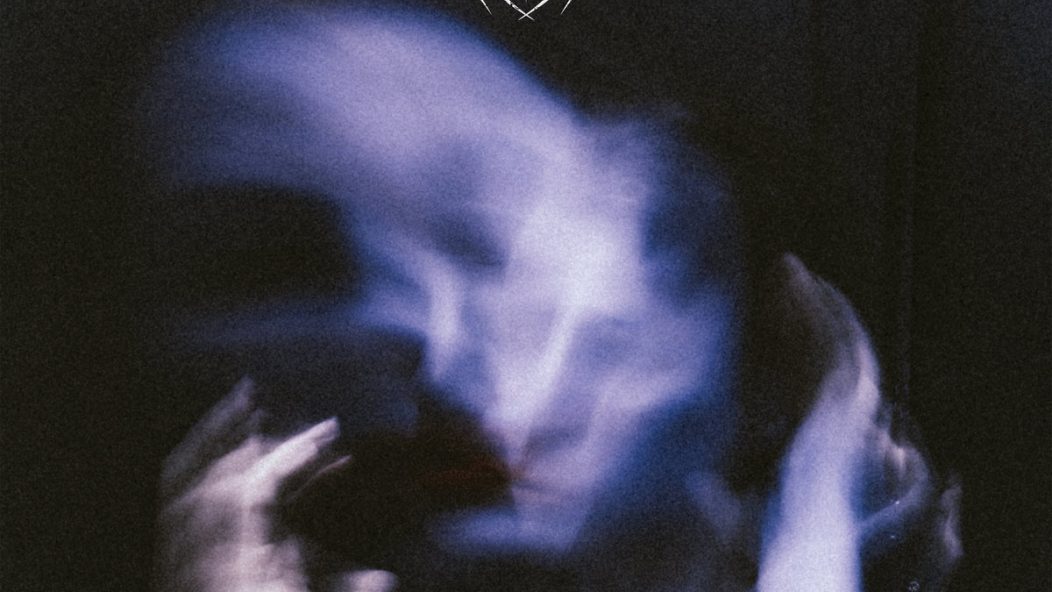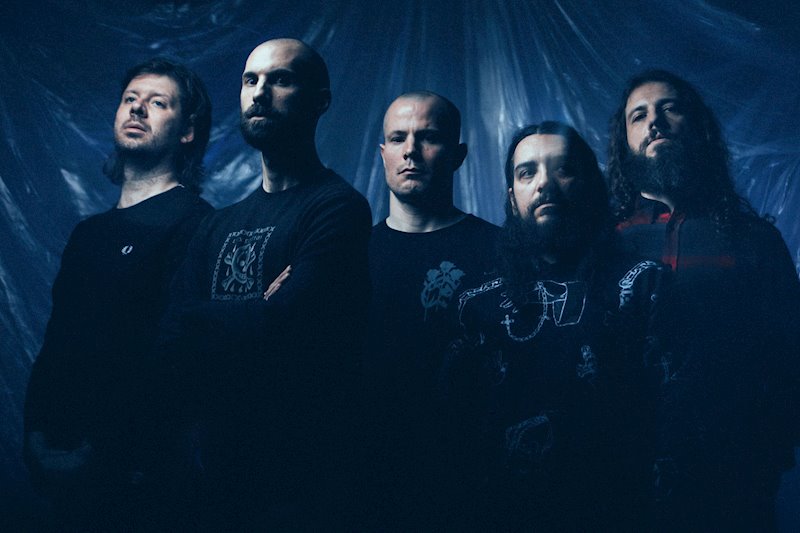
Calligram’s "Position | Momentum" is a Celebration of Chaos (and Blackened Riffs) (Interview)
We don’t often think of extreme metal as a celebratory creation. The term “cathartic” is frequently used to refer to music as caustic and icy as Calligram’s. However, the London band have no interest in using their unique brand of extremity to give shape to feelings of pain or anguish. This is jet-black metal expressed as revelry amidst chaos, a celebration of the cold unpredictability of existence.
Their latest album, Position | Momentum is the five-piece’s most elaborate and complete vision of their distinct worldview. Calligram, whose members hail from Brazil, Italy, France, and the U.K., have crafted a record defined by open-minded curiosity and grand ambition. These eight tracks are an expansion of their musical language, incorporating stretches of tense calm that make the sharp brutality all the more impactful, as well as their thematic focus, with lyrics inspired by quantum mechanics and 20th-century formalist theory.
We spoke to Matteo Rizzardo (vocals) and Ardo Cotones (drums) about Calligram’s formation, their progression as musicians and the new album’s heady themes.
…
…
I’m sure you’ve been asked this many times, but given your different backgrounds, how did you come together in London?
Matteo: Ardo had a band in 2011, and Tim was playing with them. They eventually disbanded. We then all met via an advert on Gumtree. We’ve had the same lineup since 2016, and it doesn’t look like it’s going to change any time soon.
Ardo: Because we were all from such different backgrounds, the only way to do something so specific was to use the internet. It took us a while to find the people we wanted to play with, and we spent some time experimenting. Then around the time Smittens (Calligram bassist) joined, that was when we started to feel like we were a proper band and were playing the right shows.
Do you remember your first show where you thought, “OK, this is the type of show we want to be playing?”
Ardo: Yeah we played a few where we came home frustrated. We didn’t really like the bands, and the people watching us didn’t like us either. But then we played a show in The Unicorn in London with Ithaca and Svalbard. It was the kind of gig we would attend, and that was the one where we realized that this was the scene we wanted to belong to.
At that time, did you have a vision of what you wanted Calligram to be?
Matteo: We didn’t have any idea. We just wanted to sound as fast as possible. We don’t have any references; we just try not to make music that entertains us.
strong>
Ardo: We don’t have rules of what we want to sound like, but we do know what we don’t want to sound like. Whenever we write something that sounds a bit familiar, we look at each other and shake our heads and go off in a different direction. We have an unwritten rule that if something sounds too much like something else, we go elsewhere.I think it translates; you wouldn’t be able to pin you down within any style or subgenre.
Ardo:A pet hate of mine is that we get put in the”blackened hardcore” box. I don’t like the “hardcore” bit at all.
Matteo, you speak excellent English, but perform your lyrics in Italian. Is it easier for you to express your emotions in your native language?
Matteo:A couple of albums ago, we did an album where only one track was in Italian. We thought it gave the band a deeper sense of personality, but we also realized that it worked better in terms of vocal flow. When I write, it does help in terms of emotional depth and speed of writing. But it’s mostly about the flow.
…

…
Before we get into the details of the album, can you talk a bit about working with producer Russ Russell (Napalm Death, At The Gates)?
Ardo: We were listening to the last Napalm Death album a lot in practice, and I thought because we’d written the most brutal stuff we’ve ever written, I’d send him a message. He then sent us a really encouraging message back. Our budget was tight, but we made it work. From the second we got to the studio, it was like we’d known each other for a long time. We instantly became mates and felt like we could be ourselves completely. As people, we can be really silly and intense in how we take the piss out of each other, and Russ was just laughing along with it.
This album feels like a step forward for you guys. Do you feel like you’ve progressed as musicians?
Ardo: Definitely. We really pushed ourselves to push stuff we couldn’t play. I’d never played blast beats so fast. We just kept pushing, practicing, and learning more. Whenever we defaulted to our comfort zone, we said, “No let’s not go there and try this instead.” It’s as much of an evolution as we could achieve.
Matteo: We talked before about rules. Maybe if there’s one rule we follow is that we have to push forward. We always try to make something that’s harder and more interesting than before. We wanted it to be more darker, heavier, and more fucked up in terms of structuring. We’ll never write the same album twice.
The songs on this one seem to breathe a lot more, particularly “Ostranenie.” What does that title mean, by the way?
Matteo: It means “defamiliarization.” It’s not Italian; it’s Russian. It’s from a Russian philosophical movement from last century. It’s about aiming for the loss of habit. Everything you try becomes a habit, and then it becomes boring and you lose the passion for it. Defamiliarization is the aim of reaching towards the point where everything feels new.
Wow. We’ll come back to the themes shortly. I mentioned that track because it’s got that quiet stretch with the trumpet; it feels so unlike anything you’ve done before.
Ardo: In the writing of the album, whenever we brought things down and made them slower, we wanted to then bring them back even heavier. We wanted to give things time and let them breathe. The listener then falls into the trap and is hit even harder by the brutality.
This notion of unpredictability brings me to a question I’ve been very excited to ask. Matteo, tell me about the Heisenberg uncertainty principle.
Matteo: (Laughs) So roughly, the album title refers to how, in quantum physics, when you study a particle, you can never really know its position or momentum. Behind this is the idea that completion is impossible. In life, you try to reach and aim for things but can never get to the root of them. You aim for everything, but existence is all part of this process. We are bound to never be complete.
I wrote the lyrics in a few days and realized that this was the thread. It’s about chaos and death, but not in a negative way. It’s a study or a celebration. Instead of moaning that life is shit and nothing makes sense we can embrace it.
In the press release you say, “This is not about catharsis; this is not therapy.” Can you unpack that?
Matteo: Yeah, going back to when I was young, I used to read interviews with musicians saying that making music helped them heal. What struck me was that they treated music as a tool. I see it the other way around. Talking personally, you can’t make music or any form of art if you feel shit. For me, it requires being in a good place mentally. I want to know how they do it! If anything, I feel like I’m a tool of the music.
I agree that the myth of the tortured artist is hugely overblown.
Matteo: Absolutely. The whole, “You can feel my pain in this music” thing—Fuck that. No one wants to hear anything about people not feeling great. Life is already painful enough. I’ve got enough of my own thoughts about pain.
…
Position | Momentum is out now on Prosthetic Records.










